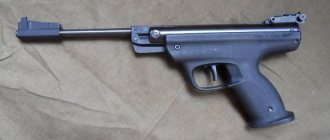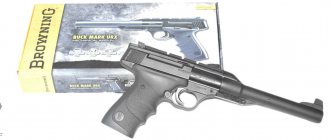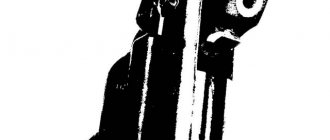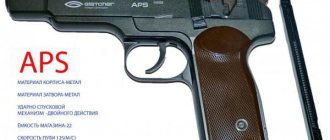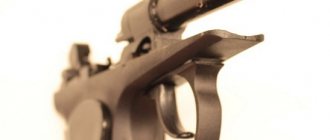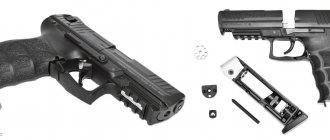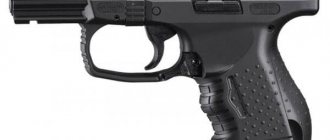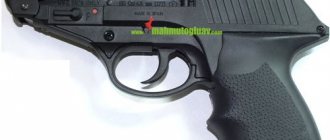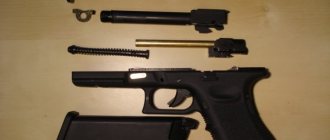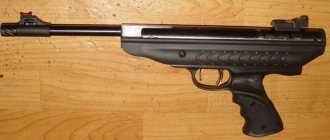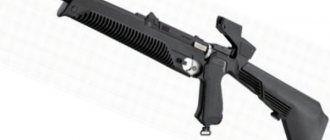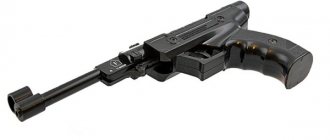Once again let's return to our air pistols. Mostly gas-cylinder models were described here, and then I remembered our native air pistol IZH-53M. We will devote some time today to this development of the Izhevsk Mechanical Plant.
IZH-53 has become one of the most famous air pistols in Russia, its low price (about 2000 rubles) made it almost a pistol within walking distance (if you don’t have it, then your neighbors have it). Of course, it is far from ideal, and now it has been well replaced on the market by foreign models in this niche, but still, I consider this pistol to be a classic; we used to shoot with such a toy even in pre-hardball times.
A little history
The IZH-53m air pistol has been produced since 1990 and is the direct successor to the IZH-40 pistol. This is where we will finish the review of the story itself.
But let’s look a little at the pistol markings. Since 1992, modernization has given it an addition to its name - IZH-53M. Modifications affected the anatomical handle for right-handers (replaced with a symmetrical one for both hands) and sighting devices (in particular, the dovetail was removed). Some people still divide this pistol into MP and IZH. We will assume that the MP-53M and IZH-53M air pistols are the same, because they are still 53e.
And here are the classic tactical and technical characteristics of the pistol.
Shot speed, m/s:
Platoon by “breaking” the barrel
Lead bullets, caliber 4.5 mm
Option 1
Option 2
In practice, from what I have seen, the IZH-53m air pistol is delivered in a box (at best, if it has not been lost along the way). The kit includes a cleaning rod (again, if you haven’t lost it). Well, the gun itself is more or less assembled.
Pistol configuration
Two configurations are distinguished from the pistol passport:
| Option 1 | Option 2 |
|
|
In practice, from what I have seen, the IZH-53m air pistol is delivered in a box (at best, if it has not been lost along the way). The kit includes a cleaning rod (again, if you haven’t lost it). Well, the gun itself is more or less assembled.
Internal structure and principle of operation
Those who like to study diagrams with the expectation of the need for future disassembly are offered the internal structure of an air pistol from the same passport.
|
|
|
|
|
According to the operating principle, IZH-53 is a classic spring-piston pistol. It is cocked using the method of breaking the barrel, just like another breaker like the MP-512 and others. When cocked, the lever pulls the piston back, the latter cocks the spring and is fixed in the extreme position. The trigger discharges this entire mechanism.
Appearance
I would like to say that the IZH-53 is the most ordinary pistol in appearance, but for some reason I can’t resist. Yes, its contours were clearly not created based on rifle motifs, but the dimensions take this barrel out of the classic range of pistols. The handle was made symmetrical, now it is suitable for both right-handers and left-handers. But some may still find it inconvenient.
The body is made of durable and black plastic. The entire interior of the mechanism is made of classic steel. The mass of the entire product is 1.2 kg, again heavier than most representatives of the world of gas-cylinder pneumatic pistols. Apparently that’s why it’s a PPP (spring-piston) - if the MP-654k could already be used as a percussion tool, then here the power of the hammer is even greater.
Functional
The shot speed is not prohibitive - approximately 100 m/s on a half-gram bullet (2.5 J). But like any other domestically produced pneumatic design, this model can be considerably tuned.
The barrel is rifled. The lead bullet is fed into the breech of the barrel when it breaks. Here's a single-shot air pistol, again a reference to rifles.
The pistol has an automatic safety lock - the shot will not fire unless the barrel is completely closed. Not the same, of course, as the Colt 1911, but for some reason it’s called that here.
Sighting devices include rear sight and front sight. The rear sight is adjustable in two planes, but its performance does not leave the user in admiration. The wide slots do not allow this pistol to be used for ideal sport shooting.
Opinions vary in terms of accuracy - from admiration for the owners of a successful model to complete frustration over defective pistols. In any case, here you need to remember about the price category of the pistol, in which it completely outperforms all competitors in its class.
The pistol is quite reliable. When cared for, it withstands any weather, temperature and bullets. Tested in combat - it hits both friends and foes at minus 20 at a distance of up to 50 meters. But still, due to its strange position in the world of pneumatics, this barrel did not gain much popularity in hardball.
Flaws
- Single shot
- Low power
- Large dimensions
This concludes this review. Maybe someone here had experience using the toy for entertainment, shooting range, or hardball purposes? Feel free to share below.
You are the owner of something very good, beautiful, say a car or a motorcycle - but you want to make it more beautiful or faster, and you have to resort to tuning and upgrading the engine in order to bring your brainchild to the ideal. It’s the same in weapons - true, in a certain sense you can’t make them more beautiful, but bringing your personal weapon to the ideal, sharpening it somewhere, changing the seal somewhere, in general, improving its tactical and technical characteristics or “upgrading” - that’s it Maybe! No stranger to the world of weapons and tuning!
The spring can be made by local uncle Vasya - the main thing to remember is that the outer diameter should not exceed the standard one (19.5 mm), and the pitch should be about 4 mm. Material – steel 65G, 50HFA (which is better), 51HFA-Sh, 60S2A, 51HFA, 65S2VA, 70S3A. Springs from 38 or 512 are longer - they need to be cut. I left 28 turns, but since IZh makes all pneumatics, if not drunk, then without drying out at all, just in case, calculate its length in accordance with your parameters: number of turns = space for the spring (with cocked bolt) / ( wire dia.+gap). There was a lot of discussion about the gap, but on average they came to the conclusion that it should be from 0, but not more than 1 mm. The smaller the more powerful, but the spring can shrink or even break due to inter-turn impacts (but for the 53rd, I think this is not so critical). The main thing is that when calculating, do not forget about the distance for cocking the pistol (about 3mm). It is advisable to sharpen the ends of the spring so that they are as rectangular as possible. Next - since you have already disassembled the gun, then at the same time take a look to see if the cylinder needs to be polished (or even sanded). Necessary? Toga forward! Denis Klimkov advised this: Cut a thread at the end of a steel rod, cut out several felt washers, and clamp them with nuts and washers at the end of the rod. The rod goes into an electric drill. Use sandpaper on the washers. And forward, at low speeds we make characteristic
